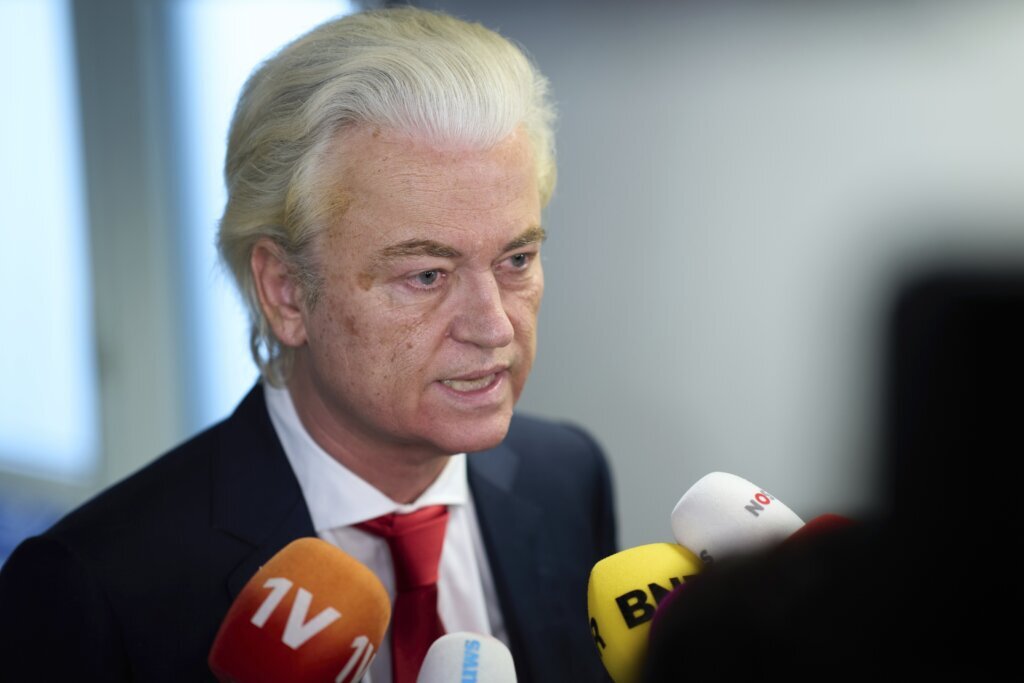
THE HAGUE, Netherlands (AP) — Far-right lawmaker Geert Wilders pulled his party out of the ruling four-party Dutch coalition Tuesday…
THE HAGUE, Netherlands (AP) — Far-right lawmaker Geert Wilders pulled his party out of the ruling four-party Dutch coalition Tuesday in dispute over a crackdown on migration, sparking a political crisis and possibly the end of the 11-month-old government of Prime Minister Dick Schoof.
Wilders announced his decision in a message on X after a brief meeting in parliament of leaders of the four parties that make up the fractious administration.
The government meltdown comes just three weeks before the Netherlands is scheduled to host a summit of NATO leaders in The Hague and amid global instability.
It was unclear what would happen next. The government could attempt to remain in power as a minority administration or call new elections for later this year. Schoof called an emergency Cabinet meeting for early afternoon.
Wilders blames inaction on migration.
Wilders told reporters that he was withdrawing his support for the coalition and pulling his ministers out of the Cabinet over its failure to act on his desire for a clampdown on migration.
“I signed up for the toughest asylum policy and not the downfall of the Netherlands,” said Wilders, whose Party for Freedom is still riding high in Dutch opinion polls, though the gap with the center-left opposition is negligible.
Prime minister appealed for leaders to act responsibly.
Dilan Yesilgöz, leader of the right-wing People’s Party for Freedom and Democracy, said before the meeting that Schoof urged the leaders to act responsibly.
“The prime minister who appealed to us this morning said that we are facing enormous international challenges, we have a war on our continent, an economic crisis may be coming our way,” Yesilgöz told reporters in parliament.
But just minutes later, the meeting was over and so was Wilders’ involvement in the government.
“I’m shocked,” Yesilgöz said, calling Wilders’ decision “super-irresponsible.”
After years in opposition, Wilders’ party won the last election on pledges to slash migration. He has grown increasingly frustrated at what he sees as the slow pace of the coalition’s efforts to implement his plans.
Last week, Wilders demanded coalition partners sign on to a 10-point plan that aims to radically slash migration, including using the army to guard land borders and turning away all asylum-seekers. He said at the time that if immigration policy is not toughened up, his party “is out of the Cabinet.”
He made good on that pledge Tuesday.
Wilders’ decision comes days after conservative Karol Nawrocki was announced the winner of Poland’s weekend presidential runoff election, a victory that suggests that Poland will likely take a more populist and nationalist path under its new president, who was backed by U.S. President Donald Trump.
It is not the first time Wilders has turned his back on power. He pledged his support to a minority government led by former Prime Minister Mark Rutte in 2010, but walked away less than two years later after a dispute about government austerity measures.
“You know that if you work with Wilders in a coalition … it won’t go well,” Rob Jetten, leader of the opposition D66 party, told Dutch broadcaster NOS.
Other coalition leaders look to uncertain political future.
Caroline van der Plas, leader of the pro-agriculture populist Farmers Citizens Movement that is part of the coalition, said she was angry at Wilders’ decision.
“He is not putting the Netherlands first, he is putting Geert Wilders first,” she told Dutch broadcaster NOS.
Nicolien van Vroonhoven, leader of the New Social Contract party that has taken a battering in polls since joining the coalition and the departure of its talismanic leader Pieter Omtzigt, said the government could continue without Wilders, saying a minority Cabinet “is definitely an option.”
Copyright
© 2025 The Associated Press. All rights reserved. This material may not be published, broadcast, written or redistributed.



